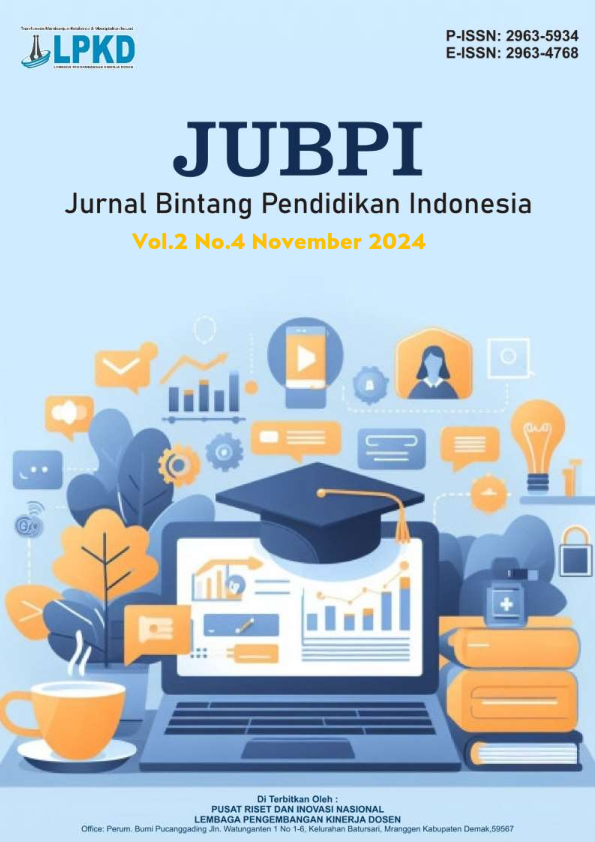Efektivitas Bimbingan Belajar Informal Tetap Muka Siswa Kelas VI Pasca Pandemi Covid-19
DOI:
https://doi.org/10.55606/jubpi.v2i4.3231Keywords:
Assessment, effectiveness, education, tutoringAbstract
The rapid development of the times and technology today has given rise to many innovations and conveniences, including in the field of education for students and teaching staff. Learning methods are no longer conventional or face-to-face in the classroom, but through online-based devices the teaching and learning process can still run, especially when the Covid 19 pandemic hit. Mamuju Regency, West Sulawesi Province, in the education sector, especially at primary school level or equivalent, there are 310 schools including state schools and private schools. In general, interest in informal education, one of which is tutoring, is still low. This journal presents data and results of mathematics learning assessments at the Ranu Prima College Tutoring Institute, Mamuju branch. The aim of presenting this data is to determine the effectiveness of tutoring in the post-pandemic period and its existence in the future. The results obtained from this activity show that the offline/face-to-face tutoring system is still more effective than the online learning system. This is proven by assessments by parents/guardians of students and students' enthusiasm for the existence of tutoring even though the duration of implementation is relatively short. Of the total of 30 participants, 25 participants remained until the program was completed, providing feedback in the assessment and assessing that the tutoring was effective in equipping students to prepare the final school exams.
References
Asyrah, A. (2022). Pembelajaran Seni Lipat Kertas Pada Kelas 2 Di Sd Negeri Kalukku Kabupaten Mamuju (Doctoral dissertation, Fakultas Seni dan Desain). (Januari 2023).
Hadiana, D. (2015). Penilaian hasil belajar untuk siswa sekolah dasar. Jurnal Pendidikan dan Kebudayaan, Vol 21 No 1 (Desember 2015).
http://e-journal.president.ac.id/presunivojs/index.php/EXPOSE/article/view/1346
http://journal.podomorouniversity.ac.id/index.php/UPPDR/article/view/105
https://doi.org/10.24832/jpnk.v21i1.173
https://doi.org/10.31004/basicedu.v5i5.1548
https://doi.org/10.47776/praxis.v1i1.535
https://edukatif.org/index.php/edukatif/article/view/324
https://ejournal.yasin-alsys.org/index.php/tsaqofah/article/view/3005
https://eprints.unm.ac.id/26740/
https://journals.alptkptm.org/index.php/jikm/article/view/10
https://proceeding.unpkediri.ac.id/index.php/seinkesjar/article/view/1310
Huda, M. (2020). Perkembangan Pendidikan Islam di Indonesia dan Upaya Penguatannya dalam Sistem Pendidikan Nasional. Journal of Islamic Education Research, Vol 1 No 2 (Juni 2020).
Korompot, S., Rahim, M., & Pakaya, R. (2020). Persepsi siswa tentang faktor yang mempengaruhi minat belajar. JAMBURA Guidance and Counseling Journal, Vol 1 No 1 (Mei 2020).
Mamuju, B. (2022). ,Dinas Kependudukan dan Pencatatan Sipil Kabupaten Mamuju.
Megahantara, G. S. (2017). Pengaruh teknologi terhadap pendidikan di abad 21. Yogyakarta: Universitas Negeri Yogyakarta. Vol 11 No 1 (Desember 2019).Monggilo, Z. M. Z. (2020). Analisis konten kualitatif hoaks dan literasi digital dalam@ komikfunday. Interaksi: Jurnal Ilmu Komunikasi, Vol 9 No 1 (Juni 2020).
Mudhita, S., Setiawan, S., Kurniawati, L. S. M. W., Marta, R. F., & Chinmi, M. (2021). Komparasi Efektifitas Komunikasi pada Bimbingan Belajar Konvensional dengan Ruang Guru di Masa Pandemi COVID-19. Expose: Jurnal Ilmu Komunikasi, Vol 4 No 1 (April 2021)
Mukaromah, P. Z., & Septianawati, E. (2021). Efektivitas Pembelajaran Matematika Melalui Media Berbasis E-Learning Ditinjau Dari Hasil Belajar Siswa. In Prosiding Seminar Nasional Kesehatan, Sains dan Pembelajaran (Vol. 1, No. 1 (Januari 2022).
Muzaqi, A., Ratih, K., & Sutopo, A. (2021). Peningkatan Motivasi Belajar Peserta Didik melalui Bimbel pada Masa Pandemi Covid-19. Jurnal Ilmiah Kampus Mengajar, Vol 1 No 2 (Oktober 2021).
Nafrin, I. A., & Hudaidah, H. (2021). Perkembangan pendidikan Indonesia di masa pandemi COVID-19. Edukatif: Jurnal Ilmu Pendidikan, Vol 3 No 2 (Februari 2021).
Nur, D. S. A. (2019). Kajian Deliniasi Kota Mamuju. Urban Planning and Property Development Review, Vol 2 No 1 (Agustus 2019).
Oktaviani, R. A., Pradiana, S., & Setiawan, N. (2022). Bimbingan Belajar Intensif Pasca Pandemi Covid-19 Di Desa Jampang, Bogor. PRAXIS: Jurnal Pengabdian kepada Masyarakat, Vol 1 No 1, (September 2022).
Puspitorini, D. A., Indriyanti, D. R., Pribadi, T. A., & Hardiyanti, L. N. (2020). Peningkatan hasil belajar kognitif melalui pembelajaran tpsw berbasis hybrid-learning materi sistem sirkulasi. Bioma: Jurnal Ilmiah Biologi, Vol 9 No 1, (April 2020).
Rosnaeni, R. (2021). Karakteristik dan asesmen pembelajaran abad 21. Jurnal Basicedu, 5(5), 4334-4339. Vol 5 No 5 (Oktober 2021).
Wibowo, B. A., Pranowo, T. A., & Febrianto, A. (2023). Sejarah Pendidikan.







